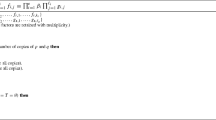Abstract
An arithmetic read-once formula (ROF for short) is a formula (a circuit whose underlying graph is a tree) in which the operations are { + ,×} and such that every input variable labels at most one leaf. In this paper we study the problems of giving deterministic identity testing and reconstruction algorithms for ROFs. Our main result is an \(n^{{\mathcal{O}}(k + \log n)}\) time deterministic algorithm for checking whether a black box holding the sum of k n-variate ROFs computes the zero polynomial. In other words, we provide a hitting set of size \(n^{{\mathcal{O}}(k + \log n)}\) for the sum of k ROFs. This result greatly improves [27] where an \(n^{{\mathcal{O}}(k^2 + \sqrt n)}\) algorithm was given for the problem.
Using our new results we obtain a deterministic reconstruction algorithms for read-once formulas that runs in time \(n^{{\mathcal{O}}(\log n)}\).
In fact, our results also hold for the more general model of preprocessed read-once formulas that we define in this paper. In this model we are allowed to replace each variable x i with a polynomial T i (x i ).
Our techniques are very close to the techniques in [27]. The main difference is that we obtain several tighter versions of the tools first used there. In particular we obtain a better version of the hardness of representation approach which was first used in [27]. This technique can be thought of as a very explicit way of transforming (mild) hardness of a very structured polynomial to an identity testing algorithm.
Preview
Unable to display preview. Download preview PDF.
Similar content being viewed by others
References
Agrawal, M.: Proving lower bounds via pseudo-random generators. In: Sarukkai, S., Sen, S. (eds.) FSTTCS 2005. LNCS, vol. 3821, pp. 92–105. Springer, Heidelberg (2005)
Agrawal, M., Biswas, S.: Primality and identity testing via chinese remaindering. JACM 50(4), 429–443 (2003)
Agrawal, M., Vinay, V.: Arithmetic circuits: A chasm at depth four. In: Proceedings of the 49th FOCS, pp. 67–75 (2008)
Arvind, V., Mukhopadhyay, P.: The monomial ideal membership problem and polynomial identity testing. In: Tokuyama, T. (ed.) ISAAC 2007. LNCS, vol. 4835, pp. 800–811. Springer, Heidelberg (2007)
Ben-Or, M., Tiwari, P.: A deterministic algorithm for sparse multivariate polynomial interpolation. In: Proceedings of the 20th STOC, pp. 301–309 (1988)
Bshouty, D., Bshouty, N.H.: On interpolating arithmetic read-once formulas with exponentiation. J. of Computer and System Sciences 56(1), 112–124 (1998)
Bshouty, N.H., Hancock, T.R., Hellerstein, L.: Learning arithmetic read-once formulas. SICOMP 24(4), 706–735 (1995)
Chen, Z., Kao, M.: Reducing randomness via irrational numbers. In: Proceedings of the 29th STOC, pp. 200–209 (1997)
Dvir, Z., Shpilka, A.: Locally decodable codes with 2 queries and polynomial identity testing for depth 3 circuits. SICOMP 36(5), 1404–1434 (2006)
Dvir, Z., Shpilka, A., Yehudayoff, A.: Hardness-randomness tradeoffs for bounded depth arithmetic circuits. In: Proceedings of the 40th STOC, pp. 741–748 (2008)
Hancock, T.R., Hellerstein, L.: Learning read-once formulas over fields and extended bases. In: Proceedings of the 4th COLT, pp. 326–336 (1991)
Kabanets, V., Impagliazzo, R.: Derandomizing polynomial identity tests means proving circuit lower bounds. Computational Complexity 13(1-2), 1–46 (2004)
Karnin, Z.S., Shpilka, A.: Deterministic black box polynomial identity testing of depth-3 arithmetic circuits with bounded top fan-in. In: Proceedings of the 23rd CCC, pp. 280–291 (2008)
Kayal, N., Saxena, N.: Polynomial identity testing for depth 3 circuits. Computational Complexity 16(2), 115–138 (2007)
Klivans, A., Spielman, D.: Randomness efficient identity testing of multivariate polynomials. In: Proceedings of the 33rd STOC, pp. 216–223 (2001)
Lewin, D., Vadhan, S.: Checking polynomial identities over any field: Towards a derandomization? In: Proceedings of the 30th STOC, pp. 428–437 (1998)
Lipton, R.J., Vishnoi, N.K.: Deterministic identity testing for multivariate polynomials. In: Proceedings of the 14th SODA, pp. 756–760 (2003)
Raz, R.: Multilinear NC 1 ≠ Multilinear NC 2. In: Proceedings of the 45th FOCS, pp. 344–351 (2004)
Raz, R.: Extractors with weak random seeds. In: Proceedings of the 37th STOC, pp. 11–20 (2005)
Raz, R., Shpilka, A.: Deterministic polynomial identity testing in non commutative models. Computational Complexity 14(1), 1–19 (2005)
Raz, R., Shpilka, A., Yehudayoff, A.: A lower bound for the size of syntactically multilinear arithmetic circuits. SICOMP 38(4), 1624–1647 (2008)
Raz, R., Yehudayoff, A.: Lower bounds and separations for constant depth multilinear circuits. In: 40th CCC, pp. 128–139 (2008)
Saxena, N.: Diagonal circuit identity testing and lower bounds. In: Aceto, L., Damgård, I., Goldberg, L.A., Halldórsson, M.M., Ingólfsdóttir, A., Walukiewicz, I. (eds.) ICALP 2008, Part I. LNCS, vol. 5125, pp. 60–71. Springer, Heidelberg (2008)
Saxena, N., Seshadhri, C.: An almost optimal rank bound for depth-3 identities. CoRR, abs/0811.3161 (2008)
Schwartz, J.T.: Fast probabilistic algorithms for verification of polynomial identities. JACM 27(4), 701–717 (1980)
Shpilka, A.: Interpolation of depth-3 arithmetic circuits with two multiplication gates. SICOMP 38(6), 2130–2161 (2009)
Shpilka, A., Volkovich, I.: Read-once polynomial identity testing. In: Proceedings of the 40th STOC, pp. 507–516 (2008)
Zippel, R.: Probabilistic algorithms for sparse polynomials. In: Symbolic and algebraic computation, pp. 216–226 (1979)
Author information
Authors and Affiliations
Editor information
Editors and Affiliations
Rights and permissions
Copyright information
© 2009 Springer-Verlag Berlin Heidelberg
About this paper
Cite this paper
Shpilka, A., Volkovich, I. (2009). Improved Polynomial Identity Testing for Read-Once Formulas. In: Dinur, I., Jansen, K., Naor, J., Rolim, J. (eds) Approximation, Randomization, and Combinatorial Optimization. Algorithms and Techniques. APPROX RANDOM 2009 2009. Lecture Notes in Computer Science, vol 5687. Springer, Berlin, Heidelberg. https://doi.org/10.1007/978-3-642-03685-9_52
Download citation
DOI: https://doi.org/10.1007/978-3-642-03685-9_52
Publisher Name: Springer, Berlin, Heidelberg
Print ISBN: 978-3-642-03684-2
Online ISBN: 978-3-642-03685-9
eBook Packages: Computer ScienceComputer Science (R0)



